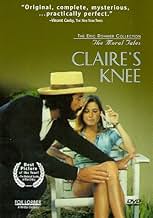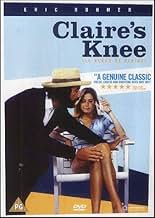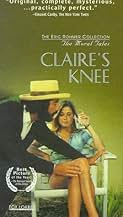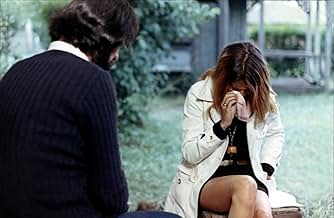Le genou de Claire
- 1970
- Tous publics
- 1h 45m
IMDb RATING
7.5/10
13K
YOUR RATING
On lakeside summer holiday, a conflicted older man is dared to have a flirt with two beautiful teenage half-sisters despite his betrothal to a diplomat's daughter and the fact that the girls... Read allOn lakeside summer holiday, a conflicted older man is dared to have a flirt with two beautiful teenage half-sisters despite his betrothal to a diplomat's daughter and the fact that the girls have boyfriends.On lakeside summer holiday, a conflicted older man is dared to have a flirt with two beautiful teenage half-sisters despite his betrothal to a diplomat's daughter and the fact that the girls have boyfriends.
- Awards
- 6 wins & 4 nominations total
- Director
- Writer
- All cast & crew
- Production, box office & more at IMDbPro
Featured reviews
In "les Liaisons Dangereuses", Isabelle de Merteuil defies Sebastien de Valmont to deflower Cécile de Volanges, a young girl, then to seduce and to reject Marie de Tourvel, a married woman. If he succeeds in accomplishing it, the bounty will be Isabelle herself.
Nothing as harsh in "Le genou de Claire", but there is the similar thematic about a gamble. Jérome (Jean Claude Brialy) meets Aurora (Aurora Cornu), an old friend (lover?). Aurora, a writer, is in search of a new story for a possible novel. She offers Jérome a gamble in the form of a love game ("marivaudage" as we say in French) involving Laura (Beatrice Romand), his neighbors daughter, who is obviously attracted by him, and, later, the Laura's sister Claire (Laurence de Monaghan) whose knee fascinates Jérome.
Unlike "The Dangerous Liaisons", not a single ounce of violence or dramatic events, everything will be just metaphorical: a half-stolen kiss and a stroked knee (and no excessive promised reward from Aurora). "Le Genou de Claire" is a filmed essay about friendship, love, sensuality, desire, fantasies and their incoherences.
As usual with Eric Rohmer, thoughts and emotions have to be said and not just shown, therefore everything is explicitly said by the characters. This is the reason why the Rohmer's movies seem unrealistic and talkative to the unprepared audiences. Some say that Rohmer is a writer who uses a camera instead a pen, but that primacy of the dialog doesn't prevent Rohmer to use the actor's play, the camera, the set's and costumes colors in a very accurate way. In fact, he is a real film director with a very personal style of cinematic language.
The cast: A Jean-Claude Brialy bearded like a pirate plays a charming young diplomat and he delivers his lines with natural ease and a sensual chemistry between him and the beautiful Aurora Cornu (a Romanian poet, novelist, and actress). Unfortunately the Romanian actress doesn't seem at ease with those long lines in French, and, in my humble opinion, she overplays quite a bit.
Beatrice Romand, 18 years old at that time, in her first true part in a movie, plays the 16 yo Laura. She steals the show, the light and the camera, and in view of some mind-blowing shots, for example in the Jérome's room, she seems to have been an obvious delicacy to light up for the great master Néstor Almendros, in charge of the cinematography. When the movie was released in 1970, the French medias became suddenly obsessed for a while by this very young actress, her exotic beauty and riveting charm. The clever and fizzy Béatrice appeared everywhere in the magazines and on the 2 (not more than two in 1970!) channels of the French TV! Then the fame faded away. The industry of entertainment prefers the blonds... The Beatrice's fans (I am a Beatrice's fan!) love Rohmer's "Le Beau Marriage", "Conte d'Automne" and Claude Faraldo's "Themroc", a situationist weird movie.
Laurence de Monaghan, in contrast with the dark haired and milky skinned Beatrice Romand, plays Claire, a tanned blond of cold beauty, in fact a perfect arrogant and stuck-up chick with perfect body, legs and knee, the famous knee, object of Jérome's desire.
For the fans of Fabrice Luccini, his short part as the young Vincent pontificating about girls is a "collector", not to be missed! By the way, still for his fans, not to be missed too there is his hilarious (and sulfurous) part in Walerian Borowczyk's "Contes Immoraux" (Immoral Tales) 2 years later. Keep in mind that "Le Genou de Claire" forms a part of Rohmer's "Contes Moraux" (Moral Tales)...
Time has passed, "Le Genou de Claire" remains amongst the Rohmer's most sensuous movie, and Claire's knee keeps on fascinating.
Nothing as harsh in "Le genou de Claire", but there is the similar thematic about a gamble. Jérome (Jean Claude Brialy) meets Aurora (Aurora Cornu), an old friend (lover?). Aurora, a writer, is in search of a new story for a possible novel. She offers Jérome a gamble in the form of a love game ("marivaudage" as we say in French) involving Laura (Beatrice Romand), his neighbors daughter, who is obviously attracted by him, and, later, the Laura's sister Claire (Laurence de Monaghan) whose knee fascinates Jérome.
Unlike "The Dangerous Liaisons", not a single ounce of violence or dramatic events, everything will be just metaphorical: a half-stolen kiss and a stroked knee (and no excessive promised reward from Aurora). "Le Genou de Claire" is a filmed essay about friendship, love, sensuality, desire, fantasies and their incoherences.
As usual with Eric Rohmer, thoughts and emotions have to be said and not just shown, therefore everything is explicitly said by the characters. This is the reason why the Rohmer's movies seem unrealistic and talkative to the unprepared audiences. Some say that Rohmer is a writer who uses a camera instead a pen, but that primacy of the dialog doesn't prevent Rohmer to use the actor's play, the camera, the set's and costumes colors in a very accurate way. In fact, he is a real film director with a very personal style of cinematic language.
The cast: A Jean-Claude Brialy bearded like a pirate plays a charming young diplomat and he delivers his lines with natural ease and a sensual chemistry between him and the beautiful Aurora Cornu (a Romanian poet, novelist, and actress). Unfortunately the Romanian actress doesn't seem at ease with those long lines in French, and, in my humble opinion, she overplays quite a bit.
Beatrice Romand, 18 years old at that time, in her first true part in a movie, plays the 16 yo Laura. She steals the show, the light and the camera, and in view of some mind-blowing shots, for example in the Jérome's room, she seems to have been an obvious delicacy to light up for the great master Néstor Almendros, in charge of the cinematography. When the movie was released in 1970, the French medias became suddenly obsessed for a while by this very young actress, her exotic beauty and riveting charm. The clever and fizzy Béatrice appeared everywhere in the magazines and on the 2 (not more than two in 1970!) channels of the French TV! Then the fame faded away. The industry of entertainment prefers the blonds... The Beatrice's fans (I am a Beatrice's fan!) love Rohmer's "Le Beau Marriage", "Conte d'Automne" and Claude Faraldo's "Themroc", a situationist weird movie.
Laurence de Monaghan, in contrast with the dark haired and milky skinned Beatrice Romand, plays Claire, a tanned blond of cold beauty, in fact a perfect arrogant and stuck-up chick with perfect body, legs and knee, the famous knee, object of Jérome's desire.
For the fans of Fabrice Luccini, his short part as the young Vincent pontificating about girls is a "collector", not to be missed! By the way, still for his fans, not to be missed too there is his hilarious (and sulfurous) part in Walerian Borowczyk's "Contes Immoraux" (Immoral Tales) 2 years later. Keep in mind that "Le Genou de Claire" forms a part of Rohmer's "Contes Moraux" (Moral Tales)...
Time has passed, "Le Genou de Claire" remains amongst the Rohmer's most sensuous movie, and Claire's knee keeps on fascinating.
This is one of the best movies of Rohmer's earlier series of moral tales. The movie wonderfully depicts the complicated relatioship between the hero and his desires, represented by Claire, and the reality of Claire's younger sister, who as masterfully played by Beatrice Romand. This is a wonderful comedy of manners, in which we can laugh at all the characters, how in their attempts to fool others, they only fool themselves. Rohmer has intricately plotted every action, I enjoyed every moment of the film.
one of the most beautiful movie by Rohmer. when I saw this film for the first time i was in Brasil (Saao Paulo) and the movie was whistled at the end of the performance by the assistance. In fact, I found the movie a little bit ridiculous and native. i reviewed this movie on TV, a few years later, in France, and was then enthusiastic. I've since become a fan of Rohmer and I've seen nearly all of his films.
A self-possessed, fortyish man of the world, on the verge of marriage, summers by the seaside, where his lust fixates on a wised-up nymphet who won't have him. Unsated, his desire moves on to her blank-faced sister--or rather, the sister's lithe, tennis-playing knee.
As always in Rohmer, the audience is cautioned to check its head in the opening scenes; we are forced to dial down to a level of attention where the nuances of conversational game-playing, phony retractions and crafty grabs at checkmate, are the only blips on our radar screen. The way Nestor Almendros photographs it, the seaside locations are so sumptuously sexual they're almost pornographic; they give the genteel proceedings a pregnancy, as if Hitchcockian mayhem is on the verge of eruption. It isn't; but the climax tells a different story from the rest of this cool, crickety, blithe picture--an ominous, O. Henryish one about the price of unfulfilled male desire.
I took a look at CLAIRE'S KNEE on the occasion of the almost-eighty-year-old Rohmer's latest picture, AN AUTUMN TALE, to see how the canon held up--is Rohmer what he seems to be, a sadder-but-wiser op-ed columnist on the subject of love intrigue? Or is he the "tasteful" poet of leetle-girl lechery? I am cynically leaning toward the latter, perhaps because I'm put off by scenes in which French males nod with ironic agreement as their little cherry pie intones earnestly, "Really, I'm a very old soul." Rohmer even has a menopausal (and hence genially washed-up) female watching the fortyish roue's frustrations with a classically Gallic laugh at the human comedy of it all. Rohmer's "tolerance" has an instructional, Old Wave fuddiness about it. And the ending--in which the roue's cruelty is undone by the innocence of youth, as if teenage girls were infants forgetting they had just fall down go boom--is creepy, like a self-reassuring entry in Humbert Humbert's journal.
But Rohmer deserves his due: he's as acute a journalist of move and countermove--some of them unconscious--as Marivaux. Unfortunately, like Marivaux, Rohmer suffers from excess courtliness. One yearns for entropic real life to drool down the sides of his porcelain.
As always in Rohmer, the audience is cautioned to check its head in the opening scenes; we are forced to dial down to a level of attention where the nuances of conversational game-playing, phony retractions and crafty grabs at checkmate, are the only blips on our radar screen. The way Nestor Almendros photographs it, the seaside locations are so sumptuously sexual they're almost pornographic; they give the genteel proceedings a pregnancy, as if Hitchcockian mayhem is on the verge of eruption. It isn't; but the climax tells a different story from the rest of this cool, crickety, blithe picture--an ominous, O. Henryish one about the price of unfulfilled male desire.
I took a look at CLAIRE'S KNEE on the occasion of the almost-eighty-year-old Rohmer's latest picture, AN AUTUMN TALE, to see how the canon held up--is Rohmer what he seems to be, a sadder-but-wiser op-ed columnist on the subject of love intrigue? Or is he the "tasteful" poet of leetle-girl lechery? I am cynically leaning toward the latter, perhaps because I'm put off by scenes in which French males nod with ironic agreement as their little cherry pie intones earnestly, "Really, I'm a very old soul." Rohmer even has a menopausal (and hence genially washed-up) female watching the fortyish roue's frustrations with a classically Gallic laugh at the human comedy of it all. Rohmer's "tolerance" has an instructional, Old Wave fuddiness about it. And the ending--in which the roue's cruelty is undone by the innocence of youth, as if teenage girls were infants forgetting they had just fall down go boom--is creepy, like a self-reassuring entry in Humbert Humbert's journal.
But Rohmer deserves his due: he's as acute a journalist of move and countermove--some of them unconscious--as Marivaux. Unfortunately, like Marivaux, Rohmer suffers from excess courtliness. One yearns for entropic real life to drool down the sides of his porcelain.
There's a lot to enjoy in Claire's Knee: the relaxed easy pace, the charming characters, the warm and insightful conversations, the stunning scenery of the French Alps.
Unfortunately I can't find any way to identify or empathize with a world that is so comfortable, so boring, so unambiguous, and ultimately, so superficial. None of the characters seem to work; no-one ever seems anxious or troubled; nothing particularly bad or good happens, or seems likely to ever happen. It's a film of low-level emotions, and low stakes -- for the characters, and for the viewers.
In this bland world, the only question of importance becomes: will the main character, a man of 35 or older, seduce one of the two teenage beauties? No particularly momentous moral calculus is involved, and ultimately the stakes were so low that I could not bring myself to care. The character is good man, or he's a lecher, or he's neither...but I feel Rohmer did not give me any reason why any of this might matter.
Claire's Knee is a hymn of praise to French charm, bourgeois comforts, and inconsequential easy pleasures. If that's your thing, enjoy yourself with this film. Me, I'll be over there in the corner, watching films by directors that ask harder questions.
Unfortunately I can't find any way to identify or empathize with a world that is so comfortable, so boring, so unambiguous, and ultimately, so superficial. None of the characters seem to work; no-one ever seems anxious or troubled; nothing particularly bad or good happens, or seems likely to ever happen. It's a film of low-level emotions, and low stakes -- for the characters, and for the viewers.
In this bland world, the only question of importance becomes: will the main character, a man of 35 or older, seduce one of the two teenage beauties? No particularly momentous moral calculus is involved, and ultimately the stakes were so low that I could not bring myself to care. The character is good man, or he's a lecher, or he's neither...but I feel Rohmer did not give me any reason why any of this might matter.
Claire's Knee is a hymn of praise to French charm, bourgeois comforts, and inconsequential easy pleasures. If that's your thing, enjoy yourself with this film. Me, I'll be over there in the corner, watching films by directors that ask harder questions.
Did you know
- TriviaNot counting a picture frame seen from a distance, the title character's first appearance takes place 47 minutes into the film.
- GoofsNear the end of the movie, Jerôme and Claire Annecy are going by boat to Annecy but must seek refuge under a shelter because of a storm. During their conversation, the irregular flow of the watering device used to create the big rain can be heard clearly.
- ConnectionsEdited into 365 days, also known as a Year (2019)
Details
- Release date
- Country of origin
- Language
- Also known as
- Six Contes Moraux V: Le genou de Claire
- Filming locations
- Production company
- See more company credits at IMDbPro
Box office
- Gross worldwide
- $5,112
- Runtime
- 1h 45m(105 min)
- Sound mix
- Aspect ratio
- 1.37 : 1
Contribute to this page
Suggest an edit or add missing content

![Watch Bande-annonce [OV]](https://m.media-amazon.com/images/M/MV5BMTgyOTk2NmMtZTk3ZS00Yjg4LWIwMzEtM2RmZDQ0ZWVhZWUzXkEyXkFqcGdeQXRyYW5zY29kZS13b3JrZmxvdw@@._V1_QL75_UY281_CR10)













